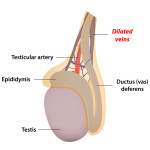 Varicocele is a medical word used to describe the swelling of the veins that occurs in the scrotum (ball sack) of some males. Have you ever noticed swollen blue or purple veins on an older person’s legs? A varicocele is similar, but the vein(s) that are swollen are so small that a lot of guys don’t even notice they have one. Read on to learn about this common condition and how it’s treated.
Varicocele is a medical word used to describe the swelling of the veins that occurs in the scrotum (ball sack) of some males. Have you ever noticed swollen blue or purple veins on an older person’s legs? A varicocele is similar, but the vein(s) that are swollen are so small that a lot of guys don’t even notice they have one. Read on to learn about this common condition and how it’s treated.
What is a varicocele?
A varicocele is the swelling of the veins in the scrotum. It’s usually painless and actually pretty common, especially in guys between the ages of 15 and 25.
What causes varicoceles?
A part of your body called the spermatic cord provides a connection to your testicles (balls), and has arteries, tubes, veins, and nerves in it. Normally, the veins keep the blood flowing from the body to the heart, and the valves keep the blood flowing in the right direction. However, sometimes the valves don’t work the way they’re supposed to, and the blood flows in the wrong direction. When this happens, the blood gets clogged up in the veins and causes the veins to stretch and get bigger or swell up. These swollen veins inside the spermatic cord are what’s called a varicocele.
How can I tell if I have a varicocele?
Because varicoceles are usually painless, many guys don’t even realize that they have one until they go to their health care provider for a regular check-up.
Signs of varicoceles include:
- Swollen veins in your scrotum that feel kind of like worms
- A heavy, uncomfortable, or dull aching feeling in the scrotum
- A painless testicular lump
- Feeling as if one testicle is larger or heavier than the other
- Testicles that look different in size
- Pain – some guys may feel pain when standing up which gets better when laying down
If I think have a varicocele, what should I do?
If you have any of these signs or symptoms, or have any questions about something that just doesn’t seem right down there, it’s important to see your health care provider (HCP). Even though it might seem a little embarrassing, health care providers are trained professionals, and they see this kind of thing all the time. Your HCP will be able to tell if you do in fact have a varicocele, or if it’s something more serious. It’s always better to be safe than shy.
How can my HCP tell if I have a varicocele?
In order to figure out if you have a varicocele, your HCP will take a look at your groin and perform a physical exam. He or she will check the area around your testicles for lumps, swelling, or tenderness. If your HCP can’t tell if you have a varicocele from the physical exam, he/she might order an ultrasound. This is a painless test that measures blood flow and can identify veins that aren’t working correctly.
What is the treatment for a varicocele?
If you have pain and swelling, your HCP may prescribe an over-the-counter pain reliever such as acetaminophen. He/she may also advise you to wear snug fitting underwear or a jock strap for support and will likely monitor the size of your testicles to make sure there are no problems. However, if the pain doesn’t go away, there are surgical procedures that can help.
Do varicoceles cause problems?
Most small varicoceles don’t cause any problems. However, there’s a small chance that a varicocele may either affect the testicle or fertility (being able to get a woman pregnant). If your HCP thinks your varicocele might cause a problem, he or she will decide on the right treatment option for you.
Remember, having a varicocele usually isn’t a big deal, so try not to let it stress you out. If you’re concerned or worried, you can always talk with your health care provider.
Source: Read Full Article





